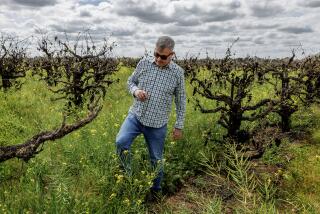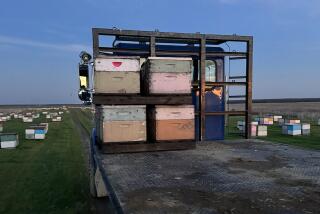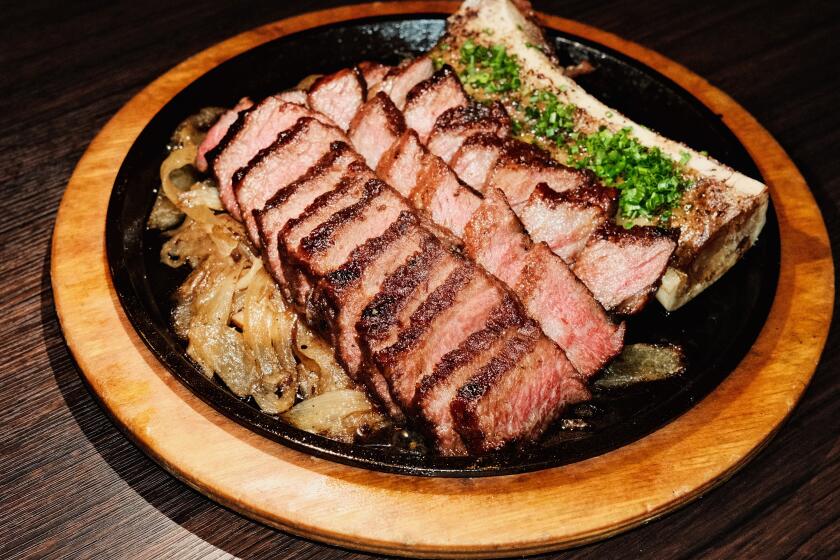Market Watch: The magnificent Warren pear
With the partial exception of Bartletts, great locally grown pears are scarce at farmers markets in Southern California, where warm winters and disease render cultivation problematic. This makes it all the more special that Al Courchesne of Frog Hollow Farm, a rock star organic fruit grower from Brentwood, Calif., an hour east of San Francisco, will make a cameo appearance the next two Wednesdays at the Santa Monica farmers market to sell his legendary Warren pears.
Arguably the most delicious pear variety in the world, praised by the likes of Alice Waters, Martha Stewart Living and Oprah Winfrey, the Warren combines the best features of its ancestors, with the intensely sweet, rich, spicy flavor of Seckel, and the larger size and voluptuous juiciness of Comice. And the mystery of its origins, heretofore never fully unraveled, is almost as delicious as its flavor.
The trail that leads to the Warren starts with fire blight, a bacterial disease that makes growing most pears virtually impossible in areas where warm spring rains are common; a winter chill is also required, which is why very few European pears are cultivated in the southern half of California.
Historically, one of the few pears of quality that was resistant to blight was the Seckel, tiny but superbly flavored, and discovered near Philadelphia around 1760. Were it not for its diminutive size, it would doubtless be the preeminent pear on the market today.
Starting before 1900, pear breeders sought to hybridize the disease resistance of the Seckel into larger-fruited varieties. In 1920, Merton B. Waite, a U.S. Department of Agriculture breeder in Maryland, came up with a seedling of the Seckel called the Giant Seckel that bore much larger fruit, and was still blight-resistant. But it was not quite as flavorful, and it never became widely grown.
Breeders working for the USDA in the mid-20th century crossed the Giant Seckel and the Comice and in 1960 released Magness, which was blight-resistant and unequaled in flavor. It was fairly widely planted at first, but it soon proved to be an erratic producer and mostly disappeared from cultivation in subsequent decades.
A curiously similar variety named the Warren was discovered by a highly respected amateur fruit grower, Thomas O. Warren, in a most unlikely locale, Hattiesburg, Miss., about 1976. In the first published description of his namesake pear, a short article that appeared in Pomona magazine in 1986, Warren wrote that he found the original tree “growing in the backyard of a friend.” Its ancestry at first was unknown.
He shared bud wood with fellow enthusiasts in the North American Fruit Explorers organization. Another story, meanwhile, circulated that he had “found it planted in front of a post office and USDA soil conservation service office.” However, according to Ram Fishman, a nurseryman and fruit connoisseur who wrote an excellent online essay about Magness and Warren pears, when questioned further about the variety, Warren allowed that he discovered it among “the remains of a test site used by Mississippi State University.” Aha!
Some seedlings from the cross from which the Magness was selected were sent to a branch station in Meridian, Miss., that has long since closed, according to Kearneysville, W. Va.-based Richard Bell, the current pear breeder for the USDA. It is likely that this station sent some of the seedlings, or grafted trees, to Mississippi State for testing, and that the experimental orchard had been abandoned by the 1970s. The hot, humid conditions in the Deep South are murder on pear trees, most of which would have succumbed to fire blight, especially if unsprayed. A resistant tree would have been extremely conspicuous; if a pear tree could survive untended in Mississippi, it could make it anywhere.
Warren, who died last year at age 96, may have been concerned in the years just after his discovery that someone at the USDA would be miffed that he had filched their experimental variety, and so devised a story about finding it in a friend’s backyard. Today, no one would care about the pedigree of a relatively obscure pear, were it not that it is so supremely delicious and that it is one of the very few varieties that can be grown in blight-prone areas such as the Deep South and parts of California, particularly by home gardeners disinclined to spray.
As word of the prodigy spread, many observers noted that the Warren seemed very similar to the Magness; some maintained that they were identical. But there are slight differences: The Warren is more elongated, can have a richer ground color and red blush, and it is more resistant to fire blight. Also, according to Bell, unpublished analyses of enzymes of the two varieties by scientists at Oregon State University showed that they were very close but differed slightly, results consistent with the theory that they originated from different seeds of the same cross, of the Giant Seckel and the Comice.
Because pear trees take five years or more to come into bearing, growers historically have not been very adventurous in planting new varieties, and so the Warren, with its unofficial provenance, has never made a big splash commercially. Pollination is tricky. Frog Hollow Farm’s Courchesne — who has 9 acres of Warren and half an acre of Magness pears, planted from 1994 to 2003 — has to use a special blower to apply pollen to his flowers to get a decent crop.
But he loves the Warren. “It’s got smooth, grit-free texture and an intense, complex flavor, with hints of guava, pineapple and honey,” he says. After taking their own sweet time coming into bearing, his trees produced a bumper crop this year, and so he looked beyond his usual domains at the San Francisco Ferry Plaza and Berkeley farmers markets, to establish a beachhead in Southern California.
The manager of the Santa Monica markets, Laura Avery, invited Courchesne to sell on Nov. 30 and Dec. 7. He will have Warren, Magness and Golden Russet Bosc pears, for $3.90 a pound, along with high-quality dried Flavor King pluots and Fantasia nectarines, and excellent jams made by his wife, Becky. The Warrens are also available at Farmshop, at the Brentwood Country Mart in Santa Monica, and through December by mail order: six fruits, about 3 pounds, for $24, plus $12.50 shipping; or 12 fruits for $35, plus $17.50 shipping. They’re great in tarts and pies, and poached.
More to Read
Eat your way across L.A.
Get our weekly Tasting Notes newsletter for reviews, news and more.
You may occasionally receive promotional content from the Los Angeles Times.






